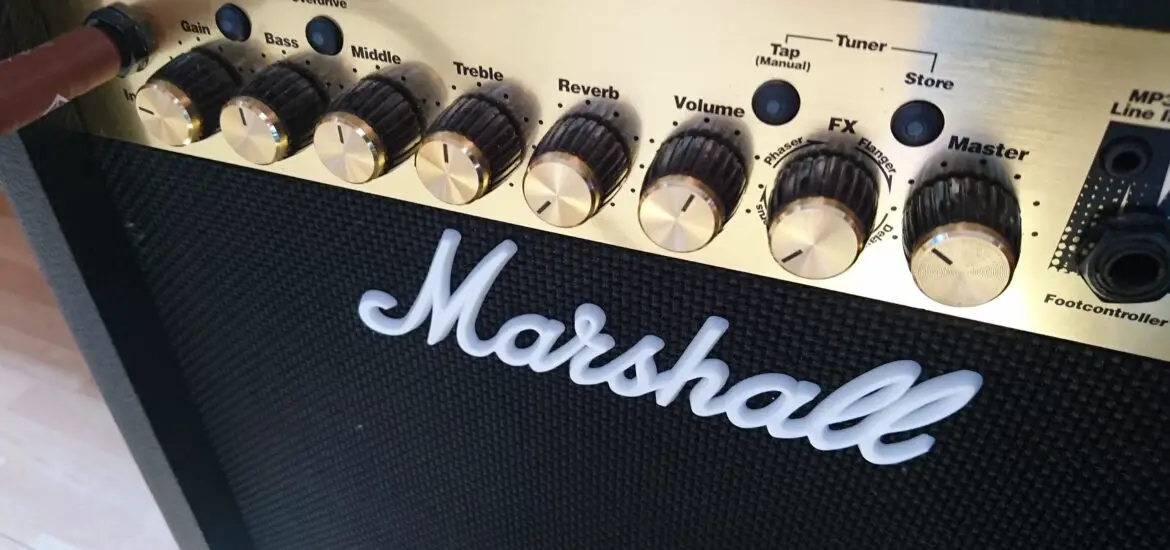If you’re wondering, “Why is guitar amp buzzing?”, you’re not alone. The issue is common, but fortunately, it is also solvable. This article will walk you through a step-by-step process to identify and fix the source of the buzz.

The Basics of Identifying the Buzz
The first crucial step in addressing your buzzing guitar amp is to accurately identify the type of buzz you’re dealing with. This step may seem basic, but it is essential for targeted troubleshooting down the line. Here’s how to go about it in greater detail:
Turn On the Amp: Switch on your guitar amp and wait for a few moments. It’s important to give it some time to warm up and stabilize.
Create a Quiet Environment: Ensure that you’re in a relatively quiet setting where you can focus on the sound your amp is making. Any other noise may interfere with your ability to assess the buzz.
Listen Carefully: Pay close attention to the buzz itself. Isolate the sound in your mind and try to characterize it. Use your phone to record the buzz if it helps; you can play it back and listen more closely.
Assess the Consistency: Now, ask yourself if the buzzing sound is constant. A constant buzz will maintain the same level of noise, without any breaks, throughout your observation period.
Check for Intermittent Buzz: Alternatively, your buzz might come and go. An intermittent buzz may fade in and out or abruptly start and stop without a clear pattern.
Take Notes: Jot down your observations. Are there patterns, like the buzzing getting worse when you strike a chord or manipulate the guitar’s volume knob? These can be important clues for further troubleshooting.
Time Duration: Consider how long the buzzing lasts. Does it fade away after the amp has been on for a while, or does it persist? Sometimes, issues become apparent only after the amp has been on for an extended period.
Repeat If Necessary: If you’re not sure about your initial observations, repeat the steps. Consistency in the buzz type across multiple observations could confirm your initial assessment.
Why Is Guitar Amp Buzzing? – How to Fix
Follow the steps below to fix your guitar amp buzz…
Check Your Electrical Connections
Faulty electrical connections are one of the most common culprits behind a buzzing guitar amp. To ensure that this isn’t your issue, do the following:
Safety First: Turn off your amp and unplug it from the electrical outlet. This ensures that you won’t experience any electrical shocks while examining the connections.
Inspect the Power Cord: Carefully look at the power cord from end to end. You’re looking for physical damage like frayed ends, nicks, or cuts that may be causing the buzzing.
Test Another Outlet: After verifying that the power cord appears to be in good shape, plug it into a different electrical outlet. Sometimes, the problem is not with the amp but with the electrical supply. If the buzzing stops, you’ve found your culprit.
Inspect Your Guitar Cables
Guitar cables can also be a source of buzzing. To check them:
Disconnect the Cable: Unplug the guitar cable from the amp. Make sure you pull from the plug, not the cable, to avoid any potential damage.
Examine the Cable: Hold the cable up to eye level and inspect it for any visible damage such as kinks, frays, or cuts.
Reconnect and Test: Plug the cable back into the amp and turn it on. Listen to see if the buzzing sound has changed or disappeared.
Read more guitar topics here – Guitar Questions: Get the Right Answers to Your Burning Questions
Test Your Guitar’s Electronics
If you’ve ruled out electrical connections and cables, the problem might lie with your guitar itself.
Access the Electronics: Remove the back panel of your guitar to expose the electronics. Make sure your guitar is not connected to the amp while doing this.
Inspect Wiring and Battery: Look for any loose wiring or connections. If your guitar has active pickups, also check to see if the battery needs replacing.
Isolate the Issue
The next step in your journey is isolating whether the buzzing is coming from your guitar or your amp. To do this, connect another instrument to your amp and see if the buzzing continues. If it stops, your guitar is the likely issue; if it continues, your amp needs attention.
Consult a Professional
If you’ve tried all these steps and are still dealing with the buzzing issue, it might be time to consult a professional for more targeted diagnosis and repair. Take your gear to a reputable technician who can offer specialized guidance.
Conclusion: Why Is Guitar Amp Buzzing?
The question of why is guitar amp buzzing can be irritating, but by methodically ruling out potential problems, you can find a solution. While some issues are easy fixes, others may require professional intervention. Either way, knowing how to troubleshoot your gear is a valuable skill for any musician.